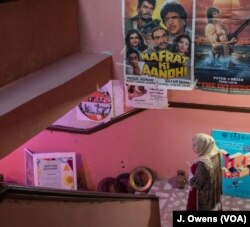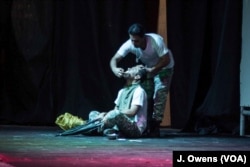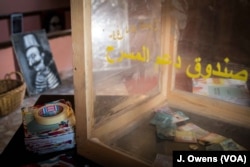Banging drums, decked in costume, striding on stilts: they all burst out into the hot, sweaty Lebanese night and swapped the subterranean confines of the cinema for the streets of Nabatieh.
Behind, them a trail of young and old danced and sang, their efforts drawing the puzzled stares of those just passing by.
In Lebanon’s most southern district, a place festooned with the banners of the powerful Shi’ite militia Hezbollah and partly rebuilt in the wake of the 2006 war with neighboring Israel, after decades of waiting arts and culture had finally found a home.
Cause for celebration
In southern Lebanon, one man is driving this sudden renaissance in theater and cinema.
His name is Kassem Istanbouli, and he was among the horde dancing through the streets of Nabatieh.
“There are not so many activities, and not so much freedom of arts [in Nabatieh] for many reasons so at night, when we did the carnival, people weren’t so used to this,” he explained, smiling.
There was good cause for celebration.
After months of hard work, he and his team, members of his Istanbouli Theatre company, had revamped Stars Cinema, a cavernous underground space in the city left to crumble after being abandoned in 1989 amid the final throes of the Lebanese civil war.
Inaccessible when work first began on the space half a year ago, it is now set to host a range of movies and act as a place for free workshops and theatre performances.
For last week’s opening night, which also launched the week long Istanbouli-run Lebanon International Theatre Festival, an Iraqi troupe explored the troubles of their homeland to a packed house.
In the audience was Mustafa Badreddine, a smartly dressed middle aged man who told VOA the re-opened cinema “represented a step towards the future, and helped show this city as a city of peace and culture.”
Long-term decline
The closure of Star Cinema matched a wider decline in theater and arts felt across the south over recent decades.
“Before the Civil war in Nabatieh there was a golden time in theatre, but things change, things disappear,” reflected Istanbouli.
Raised in the southern coastal city of Tyre and the son of a Hakawati, an Arabic term for a storyteller, he dreamed of restoring creative spaces back into the region.
“Every theater should have it’s theater and cinema culture” he explained, highlighting the current dominance of Beirut as a cultural center.
But he also saw the theater as offering a rare place in which to find common ground, not an easy thing in a country as politically and religiously divided as Lebanon.
Like much, but far from all, of south Lebanon, Tyre and Nabatieh are home to large Shi’ite communities and are centers of power for Hezbollah, which recruits youngsters into its ranks.
“We believe that through culture we can build peace,” Istanbouli said “and we can build a different type of thinking, we need a space where different people can meet together.”
With this in mind, in 2013 took his first step in reviving creativity beyond the capital, opening a small independent theatre in Tyre.
It was then just a year before he moved into Al-Hamra Cinema, a once prestigious venue that also closed its doors in 1989, and encouraged the city’s youth to join him.
Bored and with little to do, 18-year-old Ibrahim Ibrahim decided to check out one of the workshops and hasn’t looked back since.
“He is like my biggest brother” says Ibrahim of Istanbouli. “He is my teacher, he is my best friend, and he’s my boss,” he added, laughing.
Ibrahim is just one of many youngsters in the region who would benefit from opening up more spaces like Stars Cinema, claimed Ana Cendrero, who was on the Lebanon International Theatre Festival judging panel.
A cultural activist back in her native Spain, she also runs cultural events and has teamed up with Istanbouli over recent years.
“I have found many young people here full of power and wanting to express themselves, and I feel that culture is the only tool to truly help heal pain from the [civil] war,” she added.
People, not places
Ibrahim is now part of the team helping Istanbouli spread his vision.
Before the re-opening of Stars Cinema Ibrahim was running on only two hours of sleep - so busy was he with renovations that a quick doze on on the newly-installed stage the night before the re-opening had to suffice.
“I cannot explain the emotions I felt when I first saw people going back into that theatre,” 18-year-old Ibrahim told VOA.
Aside from last-minute restoration, bringing theater to the masses hasn’t been without its difficulties.
In recent months, having helped restore Al-Hamra theater in Tyre the group was unceremoniously kicked out.
It is a serious blow, but there is little chance that the team at Istanbouli Theatre are going to quit their mission that easily.
“It was hard to lose that place,” said Ibrahim, “but we can create a place anywhere we meet. The people are the most important thing,”









